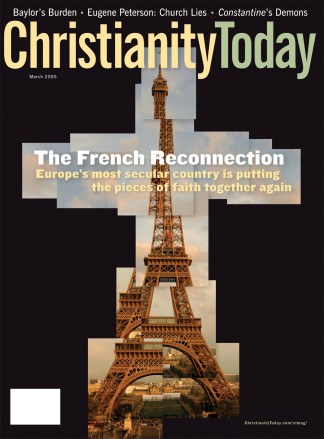Bob Pierce was an extreme version of post-WWII evangelicalism: entrepreneurial, energetic, independent, and out to evangelize the world. In 1947, the young Youth for Christ evangelist started toward China with only enough money to buy a ticket to Honolulu. That was how things were done in Youth for Christ: God’s work overcame all obstacles, and God’s workers should “burn out, not rust out.” Pierce eventually made it to China, where thousands came to Christ during four months of evangelistic rallies. Hunger was everywhere; communism hammered at the door. A compassionate Pierce was hooked. “My father went to China a young man in search of adventure,” his daughter Marilee Pierce Dunker would write. “He came home a man with a mission.”
Pierce later wrote haunting words in the flyleaf of his Bible: “Let my heart be broken with the things that break the heart of God.” Dragging a movie camera across Asia—China was soon closed—Pierce showed the resulting pictures to church audiences in North America. He asked for money to help children. He showed their faces and begged Christians to “adopt” one. In 1950 he incorporated this personal crusade as World Vision.
In 1959, journalist Richard Gehman wrote that “[Pierce] cannot conceal his true emotions. He seems to me to be one of the few naturally, uncontrollably honest men I have ever met.” When asked by Franklin Graham how to “shake people out of their complacency,” Pierce said he had “become a part of the suffering. I literally felt the child’s blindness, the mother’s grief. … It was all too real to me when I stood before an audience. … It’s not something that can be faked.” Pastor Richard Halvorsen wrote that Pierce “prayed more earnestly and importunely than anyone else I have ever known. It was as though prayer burned within him. … Bob Pierce functioned from a broken heart.”
The same intensity led to his downfall. He had an ungoverned temper and frequently clashed with the World Vision board, particularly over his insistence on making financial commitments on the fly. He traveled as much as 10 months of the year, and his family suffered. “I’ve made an agreement with God,” he said, “that I’ll take care of his helpless little lambs overseas if he’ll take care of mine at home.” In 1963 he had a nervous breakdown. For nine months he almost disappeared, preferring to travel the world rather than return home. In 1967 he resigned from World Vision, bitter at those whom he felt interfered with his organization. On a 1968 good-bye tour of Asia, his daughter Sharon reached him by phone. She asked if he could come home, but he refused, saying that he wanted to extend his trip to Vietnam. His wife, Lorraine, started home immediately, but by the time she arrived, Sharon had tried to commit suicide. Later that year, she tried again and succeeded.
By then Pierce was hospitalized in Switzerland. He would stay there for a year, treated with insulin and other drugs. The following year, he took over a small hunger organization that became Samaritan’s Purse. In 1970 he legally separated from his wife. His daughter Marilee wrote that his memory was “badly crippled” and his mind “frequently unclear.” Just once, in September 1978, the family was able to gather for an evening of reconciliation. Four days later, Pierce died.
Yet Pierce’s work continues—bigger than he could have imagined—in World Vision and Samaritan’s Purse. His passion and compassion still set the standard for others who serve the poor. God works with imperfect instruments.
Copyright © 2005 Christianity Today. Click for reprint information.
Related Elsewhere:
World Vision International‘s Who We Are document describes its history and identity. Its child sponsorship program tells the story of Bob Pierce’s vision to support children around the world.
Christian History Corner wrote about Pierce after the South Asian tsunami, saying World Vision has changed much over the years, but the vision and compassion of its founder continues to give it heart and soul.
World Vision‘s US website offers more information about its relief and development work and how to get involved.
The main article to this sidebar is:
The Colossus of Care | World Vision has become an international force—and a partner with the poor.
World Vision and other Christian aid organizations were among the first to provide relief after the South Asian tsunami. Our cover story on the tragedy, First Waves of Relief describes the many difficulties those organizations had.
A broader perspective on how Christian organizations have, and have not, stayed true to their original missions: Keeping Christ in Christian Organizations | How do faith-based groups maintain their original focus when rapidly growing in influence, scope, and professionalism?
Other articles (including some from the CTLibrary) about World Vision include:
The Church Awakens | Christians make AIDS fight a high priority. (January 2005)
Tsunami Blog: World Vision’s $50 Million Goal | World Vision raised more money online in one day than they did in all of 2003, and has set a goal of $50 million for post-tsunami assistance. (Jan. 04, 2005)
Jon Warren: Eyewitness to Suffering | As director of photography for World Vision, Warren has spent most of his career circling the globe for organizations that involve themselves in faith, social justice, and cultural issues. Photo essay (Oct. 11, 2004)
World Vision Boots Austrian Affiliate | For the first time in its 49-year history, World Vision (WV) has “disassociated” one of its international partnerships for “failure to demonstrate acceptable standards” in connection with $1.3 million in missing funds. (Feb. 8, 1999)
De-Seiple-ing World Vision | Straight talk from Bob Seiple on myopic Americans and the new realities facing international development. (June 15, 1998)
For a look at how Habitat for Humanity, another international organization with Christian roots, struggles to keep its identity, see:
How to Build Homes Without Putting Up Walls | Habitat for Humanity strives to keep its Christian identity—a tricky task, when everybody wants to join. (May 31, 2002)
Evangelism of the Hammer | How Habitat’s Christian identity gets translated in Costa Rica. (May 31, 2002)










